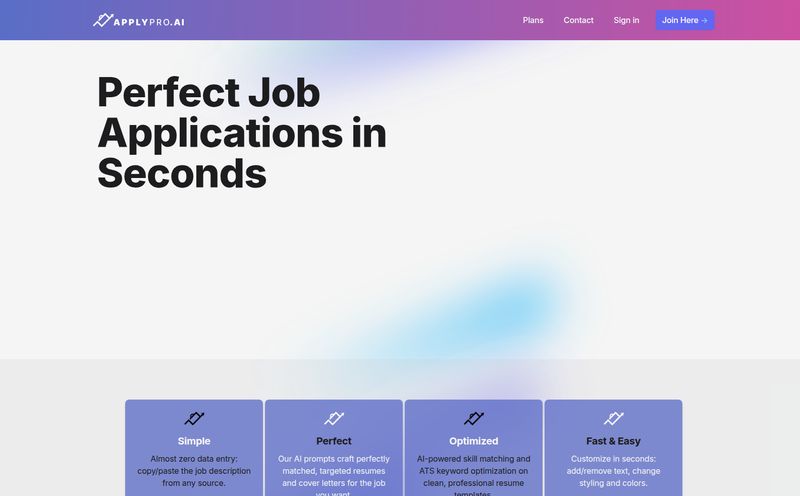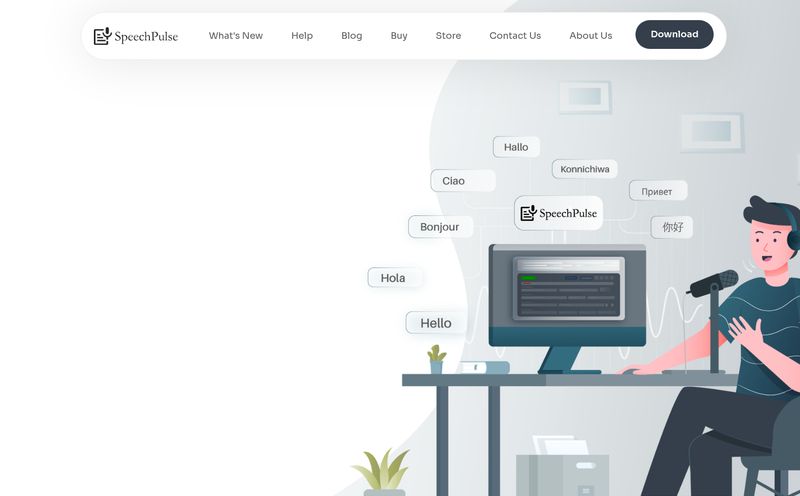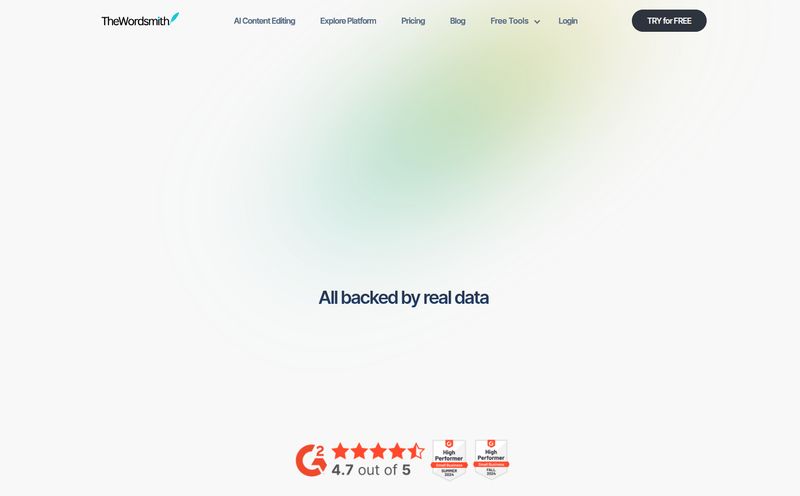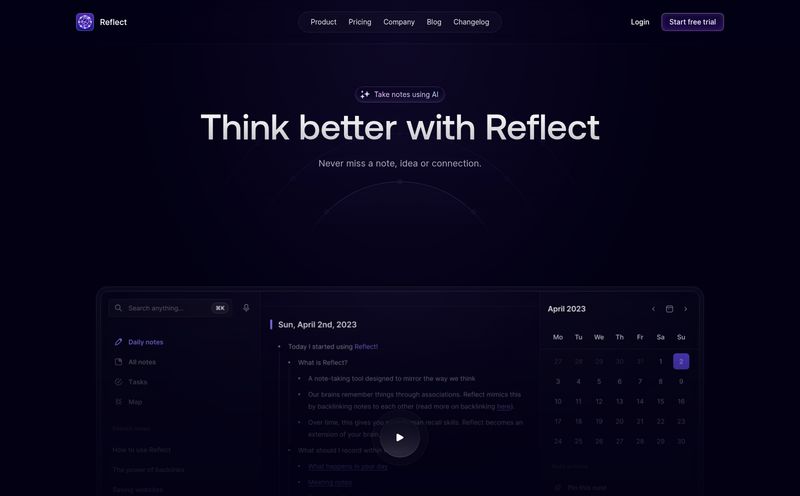We've all been there. You're staring at a blinking cursor in a ChatGPT or Gemini window, trying to coax some marketing genius out of the machine. You type in what you think is a perfectly reasonable request, something like, "Write a blog post about PPC trends." What you get back is... fine. It's a bland, Wikipedia-esque summary that sounds like it was written by a committee of robots who've only ever read other robot-written articles. It’s the very definition of “garbage in, garbage out.”
The gurus and Twitter-threads tell us the secret is “prompt engineering.” You have to learn how to speak the AI’s language, to give it roles, context, examples, and constraints. It’s a legitimate skill, no doubt. But I've got a full plate already—I’m juggling SEO audits, client calls, and trying to figure out what Google’s latest core update broke this time. Do I really have the bandwidth to become a master prompt craftsman too? I’d rather not.
That's the exact frustration that led me down a rabbit hole and spat me out on the homepage of a tool with a rather... bold name: God of Prompt. My first thought? That's some serious confidence. My second thought? Okay, you have my attention. Let's see if you can back it up.
What Exactly Is God of Prompt?
At its core, God of Prompt isn’t an AI itself. It's more like a master translator. It's a tool designed to take your plain-english goal and convert it into a highly structured, detailed “mega-prompt” that AI models like ChatGPT, Claude, and Gemini can actually work with effectively. Think of it like this: you tell a master chef, "I'm in the mood for something savory, a bit spicy, maybe with chicken," and they write a full, detailed recipe for the line cooks to follow. You provide the vision; God of Prompt creates the blueprint.
This tool promises to help you get expert-level results without needing a PhD in AI linguistics. You describe what you want—a social media campaign, a blog post outline, a piece of code, even a visual concept for Midjourney—and it builds the scaffolding for you. It’s an interesting proposition for anyone who values their time more than the art of a perfectly crafted prompt.
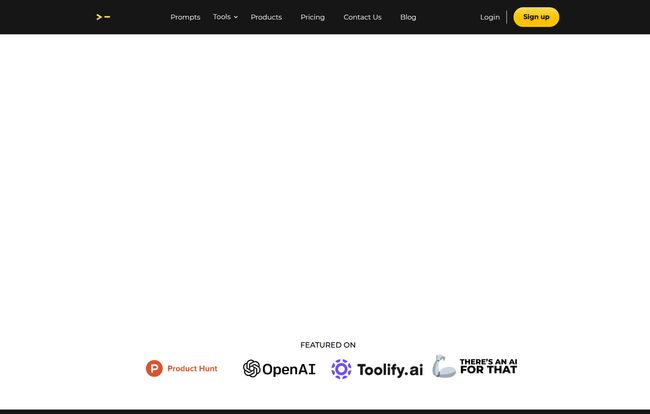
Visit AI Prompt Generator by God of Prompt
My First Experience With The AI Prompt Generator
The site offers your first custom prompt generation for free, so naturally, I took the bait. The interface is clean and straightforward. You get a big box and a simple instruction: "describe your goal/prompt like you’re chatting with a friend." So I did.
I typed in something like: "I need a detailed blog post outline for an article titled 'The Hidden Costs of Technical SEO Neglect'. The target audience is small business owners who are maybe a bit skeptical about spending money on SEO. The tone should be authoritative but not condescending, kind of like a helpful advisor. I want it to cover things like slow site speed, poor mobile experience, and crawlability issues, and connect each one back to lost revenue."
I hit the button and waited. A few moments later, it spat out a prompt that was... impressive. It wasn't just my paragraph rephrased. It was a multi-part, structured command assigning the AI a persona ("You are an expert SEO consultant..."), providing context, outlining a specific format with H2s and H3s, defining the tone, and even including customizable variables like `[Your Company Name]` or `[Link to Case Study]`. It was, for lack of a better word, a professional-grade prompt. One that would have taken me a good 15-20 minutes of trial and error to build myself.
A few minutes later, an email landed in my inbox with the prompt and a detailed PDF guide on how to best use it. A nice touch, honestly. It shows they're not just selling prompts, they're trying to teach a better process.
Breaking Down The Good, The Bad, and The "Meh"
No tool is perfect, right? So after the initial glow wore off, I started poking around to find the sharp edges. Here's my take on where God of Prompt shines and where it stumbles a bit.
The Big Wins (Why I'm Impressed)
First and foremost, this thing is a massive time-saver. As a content creator, my billable hours are everything. The 15 minutes I save not having to wrestle with a prompt is 15 minutes I can spend on strategy or editing. That adds up incredibly fast. The quality of the generated prompts is also top-notch. They incorporate best practices that many casual AI users (and even some pros) might forget, like specifying negative constraints or demanding a certain output format. I also love the customizable variables. It’s a simple feature, but it’s what turns a good template into a living document you can adapt for different clients or projects.
A Few Caveats to Consider
Okay, let's talk about the elephant in the room: the cost. After that first free hit, the custom generator is $1 per prompt. If you’re just creating one or two complex prompts a week, that’s a cup of coffee. No big deal. But if you’re a power user, that could get pricey. This is clearly where their bundles and packs come in, which I'll get to in a minute. Secondly, the tool's effectiveness is still proportional to the quality of your input. If you give it a vague, one-sentence goal, you'll get a generic (though well-structured) prompt. You still need to have a clear vision of what you want to achieve. Lastly, this tool simply isn't for everyone. Some people genuinely enjoy the process of prompt engineering. They see it as a craft. For them, using a generator would feel like a painter using a stencil. And that's perfectly fine. This is a tool for practitioners, not purists.
Let's Talk Money: God of Prompt Pricing Explained
This isn't a simple one-size-fits-all subscription. They've opted for a more 'a la carte' and bundle approach, which I think is pretty smart. It lets you pick your level of commitment.
- The Custom Generator: As mentioned, it's $1 per prompt after your first free one. Best for one-off, highly specific tasks.
- The Freebie Pack: It costs $0. It gives you over a thousand free prompts and some guides. There's literally no reason not to grab this.
- The Bundles: This is where the real value is for regular users. They offer specialized packs for different needs.
Here’s a quick breakdown of their main premium offerings:
| Package Name | Price | What You Get | Best For |
|---|---|---|---|
| Writing Pack | $37 | 200+ mega-prompts for writing, guides & tips. | Bloggers, Copywriters, Marketers |
| Web Design Pack | $27 | 1500+ Midjourney prompts for web design mockups. | Designers, UI/UX developers |
| ChatGPT Bundle | $97 | 2,000+ mega-prompts for ChatGPT, Claude, & Gemini. | General AI Power Users |
| Midjourney Bundle | $67 | 10,000+ Midjourney prompts for logos, images, etc. | Graphic Designers, Artists, Social Media Managers |
| Complete AI Bundle | $150 | 30,000+ prompts, all products included, unlimited custom prompts. | Agencies, Freelancers, Businesses |
Prices are one-time payments and accurate at the time of writing, but always check their official pricing page for the latest info.
The Complete AI Bundle is clearly the all-in-one solution. The inclusion of unlimited custom prompts makes it a pretty compelling offer if you plan on using the generator heavily, effectively turning a pay-per-use service into an unlimited one.
Who Should Actually Use God of Prompt?
So, is this tool for you? I think it boils down to what you value more: time or the manual process. In my view, it's a perfect fit for a few key personas:
- The Busy Entrepreneur: You're the CEO, CMO, and janitor. You need high-quality AI outputs for marketing, sales, and operations, but you have zero time for a new learning curve. This is your fast-track.
- The SEO & Content Marketer: You need to scale content production without sacrificing quality or originality. Using this tool to generate detailed outlines and briefs for your writers (or for the AI to flesh out) could seriously streamline your workflow.
- The Creative Professional: You're a web designer who wants to use Midjourney to create stunning mockups, but the `/imagine` syntax feels like a foreign language. The Midjourney bundles could be an absolute game-changer for you.
- The Agency Owner: Equipping your team with the Complete Bundle could standardize the quality of AI-assisted work across the board, making everyone more efficient.
Who isn't it for? The AI hobbyist who loves tinkering and learning the nuances of prompting. The student who is trying to learn the fundamentals from the ground up. There's nothing wrong with that path, it's just a different one.
The Final Verdict: Is It a Gimmick or a Game-Changer?
After spending some time with it, I'm leaning heavily towards game-changer, with a slight asterisk. God of Prompt is not a magic wand. It won't give you a brilliant marketing strategy if you don't have one to begin with. But it is an incredible force multiplier. It closes the frustrating gap between your idea and the AI's execution.
The name, while a bit over the top, points to a real truth: having a good prompt makes you feel like a god in the AI world. This tool essentially bottles that feeling and sells it to people who have better things to do than learn a new programming-adjacent language. And with a 7-day risk-free guarantee on their products, there's not much to lose by giving it a shot.
For me, it’s found a permanent place in my digital toolbox. It's a specialized instrument that I'll pull out when I need a complex job done right, and done fast.
Frequently Asked Questions about God of Prompt
- Is God of Prompt really free?
- Yes and no. You can get your first custom-generated prompt for free, and they offer a large freebie pack with over 1,000 pre-made prompts. However, continuous use of the custom generator costs $1 per prompt, unless you purchase the Complete Bundle which includes unlimited generation.
- What AI platforms does God of Prompt work with?
- The prompts are designed to be highly compatible with major large language models, including ChatGPT (all versions), Google Gemini, Claude AI, and Microsoft Copilot. The image prompts are specifically for Midjourney.
- Do I need to be a tech expert to use this?
- Absolutely not. That's the whole point. If you can describe what you want in a simple sentence or two, you can use this tool. The goal is to remove the technical barrier to getting great AI results.
- What's the difference between the generator and the prompt bundles?
- The generator creates a brand new, custom prompt from scratch based on your specific goal. The bundles are curated collections of thousands of pre-made, expert-level prompts for specific categories like writing or web design that you can use and adapt immediately.
- Is there a refund policy?
- Yes, they offer a 7-day risk-free guarantee on their products. If you're not satisfied, you can request a full refund, which lowers the risk of trying out one of teh bundles.
- Can't I just find free prompts online?
- You can, and there are many great free resources! The value proposition of God of Prompt is threefold: 1) The custom generation for unique tasks, 2) The sheer volume and quality curation of their bundles, saving you time searching, and 3) The structured, “mega-prompt” format they use, which is often more detailed than what you'll find on free prompt-sharing sites.
Conclusion
In the rapidly shifting world of AI, efficiency is the name of the game. We're moving past the initial novelty of what these tools can do and into a new phase focused on practical application and ROI. A tool like God of Prompt feels like a natural step in that direction. It's an admission that not everyone needs to be a mechanic to drive a car. By democratizing access to high-quality prompts, it empowers more professionals to get more out of the AI revolution, and I'm all for that. It's less about being a "god" and more about having a really, really smart assistant.
